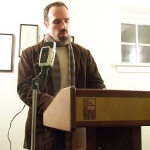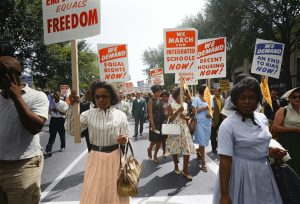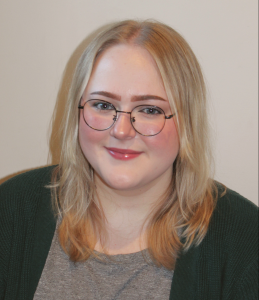
Jubilee Marshall receives the Falvey Scholar Award from Associate University Librarian for Collections and Stewardship Jeehyun “Jee” Davis.
BY SHAWN PROCTOR
This is part 3 of a 6-part series featuring the 2019 Falvey Scholars. Read more about them every Tuesday and in the upcoming issue of Mosaic: the library’s bi-annual publication.
Scholarly Stats:
Jubilee Marshall ’19 CLAS
Hometown: Washington, D.C.
Faculty Mentor: Whitney Martinko, PhD, assistant professor of History
Research: Public Health and Urban Space in Philadelphia’s Black Burial Grounds, 1750-1850, presented at the American Historical Association’s 2019 annual meeting and the Organization of American Historians’ 2019 conference
Other Honors: Fulbright U.S. Student Program award winner, Villanova Undergraduate Research Fellowship
In her own words:
Jubilee’s Research:
I began this research project in the fall semester of 2017, in the History department’s Junior Research Seminar, where I conducted a broad literature review to help narrow my topic, and wrote a Villanova Undergraduate Research Fellowship grant application for the summer of 2018.
During the summer, I focused on primary source research, and met with countless historians, archivists, and site managers (including Dr. Aaron Wunsch, Terry Buckalew, Adrienne Whaley, and Dr. Nicole Dressler) to get a sense of the landscape of churches and burials in Philadelphia in the revolutionary period. I spent a lot of time in archives.

There, I examined newspapers, church records, death records, land deeds, board of health regulations, maps, and other historical documents. In conducting this primary source research, I worked to identify trends and themes and in doing so eventually came to recognize that public health was a major concern for Philadelphians in the era.
Upon the completion of the summer grant period, I then spent the fall semester of my senior year completing supplementary secondary source research to get a broader understanding of how public health and urbanization may have affected black residents of the city from 1750-1850. In the spring semester, I wrote my thesis.
This process, which I’ve undertaken with extensive guidance from my advisor, Dr. Martinko, culminated in a 60-page, two-chapter thesis that I defended and plan to submit for publication.
Jubilee’s “Falvey Experience”:
I could not have completed this project without Falvey Memorial Library. Much of my research depended on access to online databases, such as JSTOR and Accessible Archives. Over the summer, I met with a research librarian who helped me to navigate the specific databases I was using for my project which allowed me to locate and analyze sources I would not have been able to find on my own.
I checked out countless monographs from Falvey’s own collection, and regularly used EZ-Borrow and Interlibrary Loan to access other relevant texts that were not available in the stacks. Having access to this network of libraries allowed me to incorporate secondary source works that ended up being central to my broader argument. I also learned from the research librarian that I could request microfilm through ILL and view it in the library.
This was very helpful as I relied heavily on church records, many of which have been transferred to microfilm but are not yet available on the web. In addition to these services, I also used the library for my logistical needs. It provided me with a place to work, and with crucial access to a disk drive — my computer does not have one, and local historians frequently sent me CDs full of historical data. Falvey Memorial Library not only enhanced my project but made it possible, providing me with the resources and active guidance necessary to ensure my work would be well-supported.
The Impact on Her: 
I have learned a lot and developed a wide array of skills from my research experience. In addition to learning how to locate, organize, and analyze sources, I have also learned how to navigate physical and digital archives; how to network with other historians in order to tap into existing networks of shared knowledge surrounding my research topic; how to successfully manage a long-term project; what work style best suits my needs and habits; how to apply for grant money; how to think broadly about historical evidence and think creatively about how to answer questions when the answers are not immediately evident in the historical records; how to write a thesis-length paper; and, finally, how to present my information and argument in multiple mediums in a way that is both engaging and convincing.
In addition to these skills, this research experience has also enable me to present my research at professional conferences, including the American Historical Association’s 2019 Annual Meeting and the Organization of American Historian’s 2019 conference, which has given me insight into the world of academia and helped to inform my post-graduate plans.
What’s Next:
Jubilee will work as a Fulbright English Teaching Assistant in the Czech Republic. Upon completion of her Fulbright year, she intends to pursue a graduate degree in the field of Public History.

Shawn Proctor, MFA, is communications and marketing program manager at Falvey Memorial Library.





 Annie Stockmal is a second-year graduate student in the Communication Department and Graduate Assistant in Falvey Library.
Annie Stockmal is a second-year graduate student in the Communication Department and Graduate Assistant in Falvey Library.


 The Villanova campus community is invited to join Campus Ministry for an evening of prayer and reflection, April 27, 7-8:15 p.m., with the song and spirit of Sr. Thea Bowman, FSPA. Presenters Rev. Naomi Washington-Leapheart and Michelle Sherman will guide participants through the story of Sr. Thea using examples of song, service, and struggle as she called the Church to address its institutionalized racism.
The Villanova campus community is invited to join Campus Ministry for an evening of prayer and reflection, April 27, 7-8:15 p.m., with the song and spirit of Sr. Thea Bowman, FSPA. Presenters Rev. Naomi Washington-Leapheart and Michelle Sherman will guide participants through the story of Sr. Thea using examples of song, service, and struggle as she called the Church to address its institutionalized racism.

 Kelly McMahon CLAS ’22 is a student assistant in the Communication and Marketing department at Falvey.
Kelly McMahon CLAS ’22 is a student assistant in the Communication and Marketing department at Falvey.


